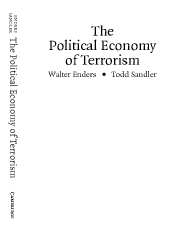Book contents
- Frontmatter
- Contents
- List of Tables and Figures
- Preface
- 1 Terrorism : An Introduction
- 2 The Dilemma of Liberal Democracies
- 3 Statistical Studies and Terrorist Behavior
- 4 Counterterrorism
- 5 Transference
- 6 International Cooperation : Dilemma and Inhibitors
- 7 Hostage Taking
- 8 After 9/11
- 9 The Economic Impact of Transnational Terrorism
- 10 Homeland Security
- 11 The Future of Terrorism
- References
- Author Index
- Subject Index
10 - Homeland Security
Published online by Cambridge University Press: 06 July 2010
- Frontmatter
- Contents
- List of Tables and Figures
- Preface
- 1 Terrorism : An Introduction
- 2 The Dilemma of Liberal Democracies
- 3 Statistical Studies and Terrorist Behavior
- 4 Counterterrorism
- 5 Transference
- 6 International Cooperation : Dilemma and Inhibitors
- 7 Hostage Taking
- 8 After 9/11
- 9 The Economic Impact of Transnational Terrorism
- 10 Homeland Security
- 11 The Future of Terrorism
- References
- Author Index
- Subject Index
Summary
The unprecedented attacks on 9/11 underscored the importance of an overall strategy for homeland security that not only coordinates agencies' efforts to prevent terrorist attacks, but also takes decisive actions to promote recovery following an attack. The magnitude of the 9/11 incidents, with approximately 3,000 deaths and over $80 billion in property and earnings losses (Kunreuther and Michel-Kerjan, 2004a, 2004b), indicates that terrorism poses a significant risk. On 11 March 2004 (henceforth 3/11), Madrid's commuter train bombings again emphasized the vulnerability of industrial countries to terrorist events. As terrorists seek in the future to outdo the carnage of 9/11 and 3/11, they may eventually resort to the use of weapons of mass destruction (WMD) (see Chapter 11). Thus, preventive measures by the authorities must address a wide range of possible attack scenarios, including standard terrorist attacks and those involving biological and chemical agents. By the same token, plans must be in place to respond to all possible attack scenarios. The digital age and the complexity of modern-day society provide terrorists with the opportunity to cause mass disruptions in communications, energy supply lines, and transportation.
In order to have effective homeland security, component agencies must act in unison not only at the same jurisdictional level but also between jurisdictional levels. That is, the federal, state, and local agencies must cooperate. Agencies' collective action failure will lead to wasteful duplication and the inability of agents at one jurisdictional level to inform those at another level about a pending attack or threat.
- Type
- Chapter
- Information
- The Political Economy of Terrorism , pp. 224 - 244Publisher: Cambridge University PressPrint publication year: 2005



